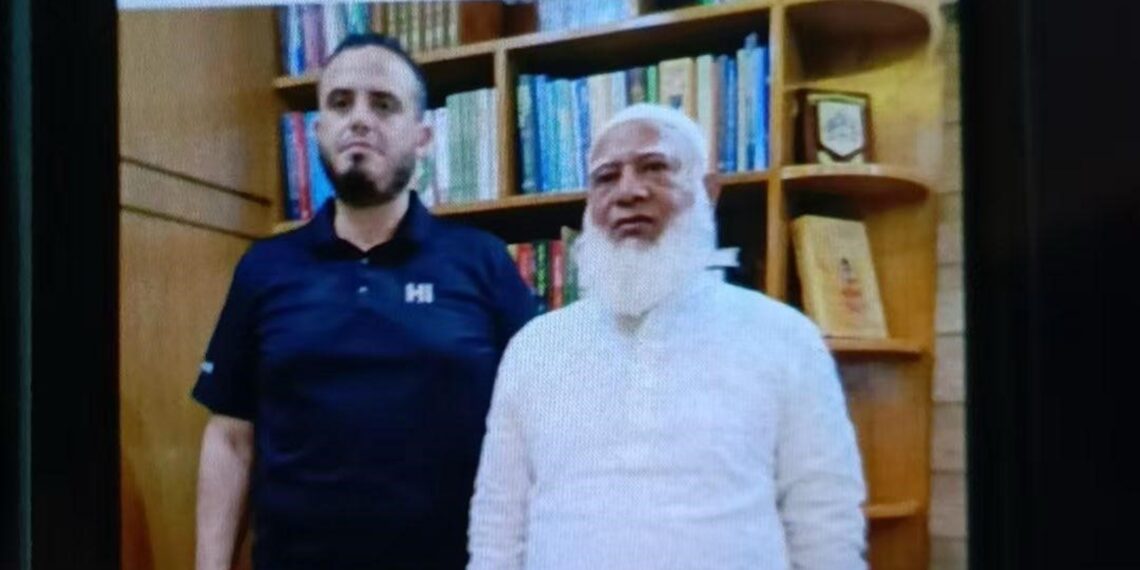Clandestine meetings between the Bangladesh Jamaat-e-Islami naib-e-emir and a Palestinian scholar-activist in Dhaka twice in January and this month have set alarm bells ringing in New Delhi and western embassies in the Bangladesh capital.
While there is little or no information on what may have transpired in the meetings between Jamaat-e-Islami emir Shafiqur Rahman and Professor Abd-al-Fattah El-Awaisi, said to be a distinguished scholar in International Relations and the founder of the field of Islamic Jerusalem Studies, the timing of the two closed-door confabulations comes at a critical time even as Islamic resurgence has reared its head in Bangladesh.
Indian security officials are particularly “concerned” over El-Awaisi’s entry into Bangladesh and which persons or organisations in Dhaka facilitated and hosted the visiting scholar-activist who is believed to have “some” links with the dreaded militant group, Hamas, or the Islamic Resistance Movement (Harakat al-Muqawama al-Islamiyya).
Rahman and El-Awaisi met once in January this year in Dhaka. Still, they had a prolonged parley on February 3, on the sidelines of a “public seminar” organised by the Institute of Islamic Thought and Research in the Bangladeshi capital. The seminar titled ‘Geopolitical and Economic Impact of the Gaza Genocide’ threw light on pressing issues related to the Israel-Hamas conflict,
But the highlight of El-Awaisi’s February visit was his lecture on the crisis in Gaza and its broader geopolitical implications. Sources close to the seminar organisers said El-Awaisi’s engagements provided “valuable insights” on current “geopolitical dynamics” and underscored El-Awaisi’s “commitment” to fostering academic discourse on critical global issues.
A Palestinian-Canadian national and journalist Shouman Mansour is said to have organised El-Awaisi’s seminar in Dhaka. An avid social media user, Mansour has used Instagram and Facebook to share “firsthand accounts” of the humanitarian crisis in the region.
Mansour was reported missing from Gaza in January 2024 amid the armed conflict, but he later resurfaced after several weeks.
However, the Rahman-El-Awaisi meetings have raised eyebrows among keen Western diplomats stationed in Dhaka and Indian security officials who view the Palestinian scholar-activist’s visit with consternation, especially at a time when Bangladesh is undergoing profound socio-political transformation pushed to a large extent by the emergence and increasing influence of fundamentalist Islamist outfits such as the Hizbut Tehrir and the Jamaat.
What had muddied the political and security landscape is the Mohammad Yunus-led interim authority some of whose advisors, primarily those heading the Law and Home ministries, are said to be instrumental in releasing convicted terrorists and undertrial alleged Islamist extremists from prison.
The deepening of anti-India sentiments over the last several months, followed by threats against India from extremist elements and Hizbut Tehrir-backed students’ coordinators have only served to heighten tensions.
Not long ago, Pakistani ambassador to Dhaka, Syed Ahmed Maroof is also said to have met Rahman on two occasions – in Cox’s Bazar on February 7 and at the Jamaat-e-Islami party office in Dhaka four days later.
In the first meeting held on a sea vessel, Keari Sindabad, two other Jamaat leaders, party Assistant General Secretary Hamidur Rahman Azad and Mohammad Shahjahan, were present alongside Rahman.
At least four activists belonging to the Arakan Rohingya Salvation Army (ARSA) were also part of the meeting.
Four days later, Maroof met Rahman at the party’s Dhaka Jamaat headquarters where others, including Pakistan Deputy High Commissioner Muhammad Wasif, Political Counsellor Kamran Dhangal besides several senior JeI leaders such as former MP Syed Abdullah Mohammad Taher, Maulana A N M Shamsul Islam and Professor Mia Ghulam Parwar.















